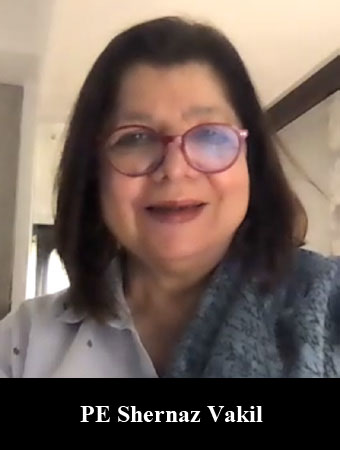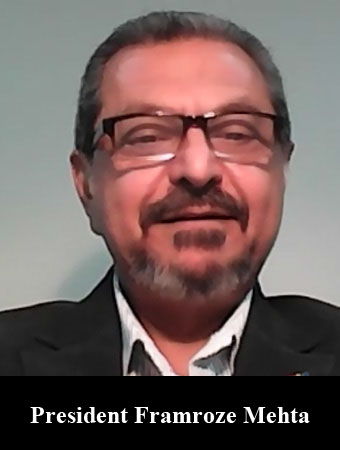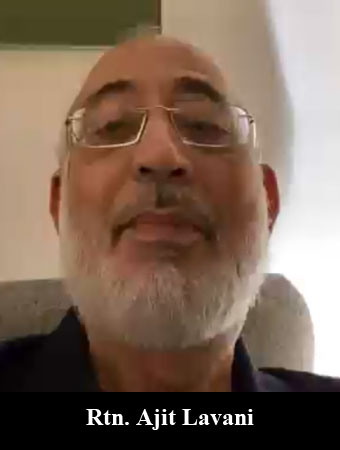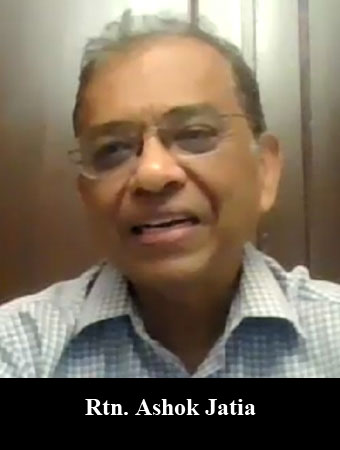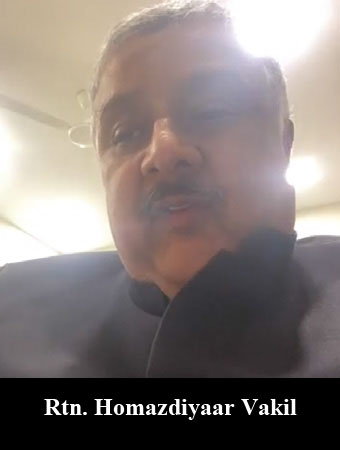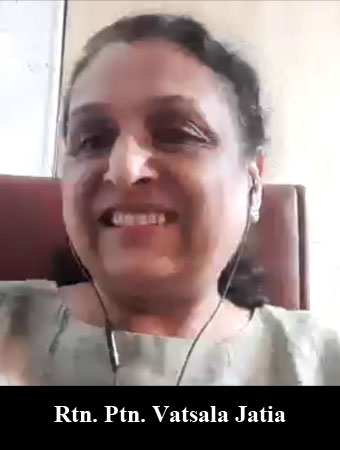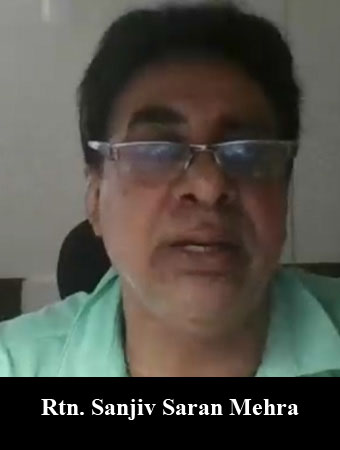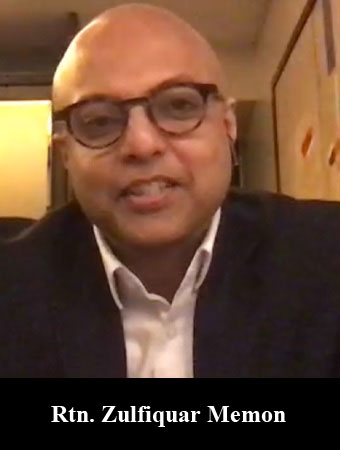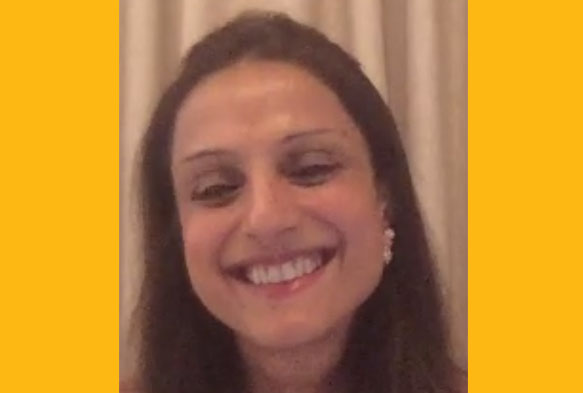
Smita Jatia, Managing Director, Hardcastle Restaurants (Mcdonald’s India – West & South) Redefines Junk Food, In Conversation With Rtn. Farhat Jamal
THE DEFINITION OF JUNK FOOD IS RELATIVE. UNFORTUNATELY, IN OUR COUNTRY, BURGERS AND PIZZAS ARE THE FIRST PICTURES THAT COME TO US WHEN ONE TALKS OF JUNK FOOD. HOWEVER, IT IS NOT ABOUT WHAT YOU EAT; IT’S HOW MUCH OF WHAT YOU EAT. A LOT OF INDIAN FOOD CAN ALSO BE NAMED UNDER THE JUNK FOOD LABEL BECAUSE IT IS HIGH IN FAT, SATURATED SUGAR. THUS, IT IS ALL ABOUT FOOD QUALITY, HYGIENE AND WHAT GOES INTO THE FOOD.
Over the years, we have been receptive of how the Indian consumer is. When we started the brand, we researched with
housewives and, for them, the burger was a balanced and nutritious meal; why? Because children ate wheat which is carbo-hydrates, it had vegetables and it was given to them in a clean and hygienic way. At that time, very clearly, mothers were okay with it – not for everyday but for a treat or occasionally. Moving forward, today, millennials are very conscious of what they eat and what they do. However, they are also indulgent at the same time. It is not that they are eating only healthy. If I had to put in perspective, everywhere in Asia and globally, people eat out 25-30 times of the 90 meals in a month. In India it is 12-15 times, so, it is very nascent in India. When they go out, they want to indulge, they don’t just want healthy food.
Having said that, we have reduced about 40 per cent oil from all our mayonnaises and sauces, we have reduced 20 per cent of salt in our burgers which reduces calories by 11 per cent. We introduced the whole wheat bun. So, the customer has a choice, they can eat normal bun or a whole wheat bun. We have an egg burger which is a complete steamed burger, we have grilled and fried options. Moreover, even in our desserts, our soft serves have only 90
calories.
It is all about educating people, making them understand. In fact, we have even gone to the extent that our aloo tikki burger has been certified by the nutrition institute as a balanced meal. Which means that if you eat that burger, you get your percentage of proteins, carbohydrates and fats in that one meal.
We work to educate customers. I don’t think of it as junk food, however, as customer awareness increases, globally, they have salads and grills, so all of these are being added to the portfolio of our products and it gives confidence to the customers to come in: one, because of its nutritious content secondly, because of its sourcing.
We have one of the most sustainable sourcing of products right from the farm to the fork. In fact, just to give you snippets, before McDonald’s, there was no iceberg lettuce. We helped the farming of the iceberg lettuce, we actually helped the farmers get us the potato quality we needed for our french fries and, by doing this, the farmers have benefitted by getting higher yield per hectare and better-quality crop.
I feel it is a misnomer and a label which junk food or QSRs or fast-food restaurants have but at the end of it there is a balance of what you eat, how much you eat and what you do. There is always a balance in life and that is where at least my head is and what I do. I am sure everybody is going to ask do I eat McDonald’s? I would say, yes, we do eat McDonald’s and all my family members who are here on this call will also say that I am a fitness freak. So, yes, I also exercise it out.
Please share two-three of your biggest learnings.
We are entering our 25th year in India and I am honoured to lead such a big brand in India. I learn every single day but, to share a couple of them, the first one would be that success doesn’t come to meet you in your comfort zone.
I was leading a comfortable life with my family, my children and I don’t think I would be where I am on this incredible journey if I had not come out of my comfort zone. Coming out of your comfort zone is vital to success. Second, if you want to run a sustainable business, you have to create advantages because they are transient, meaning, what is an advantage today may not be so tomorrow because your competitor would have copied it and therefore you have to keep reinventing as a brand. For that, agility and adaptability are important that every brand in four-five years metamorphizes into a great legacy in which you can get your next five years.
McDonald’s has been there for more than 50 years but every four to five years it has been able to pivot and move to the next orbit to be able to connect with consumers. So, consumers of yesterday are not the consumers of today. Today’s millennials and digital natives – even I struggle to understand what they need and what they consume but you have to be in learning and agile and adaptive to be able to create something which is sustainable in the long run and thirdly, at least in order to gain control, you have to relinquish control. Meaning, for me the true manifestation of power is to actually be able to distribute it, delegate it and hold people accountable because then everybody is a part and a stake holder in what you are trying to do.
My leadership style is participative and I believe in delegating and being able to hold people accountable and I think that is one of the reasons I have been able to juggle many roles. Obviously, as a leader, you have to lead from the front but it is not necessarily as a leader that you have to be everywhere.
I cannot be prouder of my team today who are actually on the field in this crisis making the difficult calls because I have empowered them to do so, and at the same time where I have to make strategic calls, I am doing so even sitting in London. Nobody could have believed that we would be working from home in the last six months. So, whether I am working from home in Mumbai or London, I think the critical thing is your team.
You can only make a great team when you are able to give the control and you are able to make them accountable so, for me, that has been my biggest learning right from being a marketing manager to the Managing Director and it has always been something that I kept in my head, which I learnt very early in the game from one of the McDonald’s people that if you want to grow, you have to make yourself redundant and every time I got into a position, my only one goal was to make myself redundant in that position by which I was able to take more and more responsibilities. So, these are some of my learnings.
So, you have built a successful business over 25 years, 300+ restaurants, 10k odd people, 1000 crore plus turnover. How do you keep the fire burning? I mean what next, Smita?
That is a loaded question. I often wake up in the morning and I think what next? The score is multiplying. Like I said I am fortunate to be leading a network for 320 stores now, we are selling 140 burgers per minute, we sell about 15,000 coffees a day and we are the second-largest chain to sell coffees after CCD. We sell more coffees than anybody in India and we grow about 28,000 tonnes of potatoes. So, things are multiplying.
I am blessed with a leadership team who is doing this and I often wonder what is the purpose of my brand in India because I feel only brands which have purpose can create a legacy. Once a brand comes to a certain scale and has the ability to do so, it has to give back to the community, if a brand doesn’t give back to the community, it can be a successful business but it cannot be a legacy. I think that is my focus, moving forward. I have been fortunate to lead, McDonald’s is the pioneer of the western fast-food category. We were the first.
Eating out is a big category, it is about 100 billion but western fast food is only 1 per cent and we were the ones who actually started the category. As I mentioned, there was no iceberg lettuce before us and we actually helped cultivate iceberg lettuce.
Secondly, before retail and McDonald’s, a 12th standard pass would normally become domestic staff or a peon. After McDonald’s and a lot of peers started, a 12th standard pass can gain employment and, while they are studying, work. We have numerous cases where people have joined at 12th std, have become senior people in our organisation as well as been able to complete their education.
And, we give life skills, so people have joined us as their first jobs, there are stories across the world where you want the pocket money, you join McDonald’s and after that they have become very successful people like just again, on a lighter note, Smriti Irani had actually worked at McDonald’s.
So, I feel proud to say that we give employment and growth. Every year we take 2000-3000 people in our fold and finally it is about what else you can do for the community. We have house charities where we have started family rooms for children who are terminally ill and who don’t have places to stay and these rooms I would like to extend to homes and I am sure some of you who have travelled abroad know about these homes where people have found shelters. So, this is what always keeps me awake at night and I always think of how to make this brand a legacy in India at least.
Every international brand has high standards and can be stifling on innovation because you are limited to certain of things that you do. So, does Smita throw the rule book out occasionally and run Smita’s way?
People who know me know that I am stickler for rules. In fact, when my children were small, I was called Hitler. Apparently by a lot of people, so, I am a stickler of rules but I also think what McDonald’s does beautifully is that it gives freedom within the framework and this framework is very well defined but as well as very loose framework and that is the reason why McDonald’s has survived in 120 countries. In fact, we are the only country which has a 50 per cent vegetarian, apart from the Aloo Tikki burger which we started exporting. Most of our products are innovated in India and we have to obviously understand what they want from a nuance point of view. So, we aren’t allowed for instance to sell idli dosas, or vada-paav or samosa. No body is going to come to McDonald’s and eat a samosa. At the end of it, you have to know the essence of the brand and the essence of the brand that we are a burger leader and what we had to innovate is that to give the unique form of a burger but give it that Indian taste and that is where we have been successful.
The brand is what is lending me the fire power to get what we need in India to be able to attract the consumers, to be able to understand what they need and that is the strength. So, why would I go against that. Yes, but the most important thing is the business goal. It is about aligning with the business goal and once the franchise is aligning with the business goals, they pretty much leave us alone, because they have trust on who we are and what we do. So, the same principles of respect, trust, that goes a long way in making a brand successful.
A friend of mine said that this is not junk food, it is safe food because it has been cooked at a specific temperature and the quality control in sourcing the foods, what do you think? And secondly, with the success of beyond meat do you think McDonald’s would become a plant-based burger company only in these 2 years?
On the first one, it is exactly what you said, we are safe. Clean food. If actually you come to our restaurants, we give restaurant tours, we are the only brand who takes our customer behind the scenes and you can actually see what is being made. We are 100% veg and non veg segregated. So, even the true vegetarians don’t hesitate in coming and eating there and everything is governed by SOPs, so, in any of the outlets the French fries are cooked at a particular temperature, for a particular number of minutes. So, we are safe, hygienic and quality food.
On beyond meat, it is doing very well globally because 80-90% of people are non-vegetarians and they are the ones who want to convert to vegetarianism. They want that bite and they want that texture and that is where they get the beyond meat plant-based burgers. In India 50% of our customers are pure vegetarians and in fact most of them even don’t like mock meat because they don’t like the chewiness. And the other 50% I don’t think at this point India is ready for plant-based burgers. First it will start with a fad and there will be a niche customer base and that is something which we don’t go after because our business goes with the masses. Unless we have a critical mass of selling certain products, we actually take it outside our menu. Every year we delete and add something because our success is all about limited menu. So, the day when beyond meat burgers are wanted by customers, it has to be a mass need.
Going forward, what are the challenges you foresee from oversees and local brands and do you think that the market is large enough for everybody? Secondly to what extent did you modify products according to the Indian taste and pricing?
So, the eating out category is 100 billion and the fast-food category is only 1 %, so, for us it is only a room to grow. It is a growing category and to me it is here to grow. The challenges we are facing today is because of covid otherwise we were growing to about 15-20%. So, there is no question that it is a saturated category and any point of players makes it better because there is consolidation and players are also weaned out. Post Covid, which we are going to face is that the customer again wants crust and assurance and we are leader of that so, there is no question that we will be the pioneers to lead this and a lot of consolidation is going to happen. Roadside vendors and the Indian fast-food players are going to find it difficult to survive at this situation. Secondly the minute there was McDonald’s and our peers, we already saw deliveries growing and our challenge we made it into a convenience occasion. We made the take-aways more accessible. We always had drive-through. Then, this is a point where the brands can create a new vertical. So, we have converted all our restaurants into virtual drive-through, there is an on-the-go option. So, while the pandemic fear psychosis is there, convenience is going to go to a different orbit and that is what the brand is built of. From food taste, yes, there is a taste that is adapted to the Indian pallet, we are very proud of the burgers because we are the leaders and that is where we mind the taste.
You will see that there is a flavouring which is tuned to the Indian pallet and about price, we had a campaign “aaj ke zamane mein baap ke zamane ka daam” McDonald’s in the beginning was a niche brand. After a few restaurants which were going very well, people were intimidated to come to McDonald’s because they thought it will be expensive because we were a clean façade so, the masses thought that we will be expensive. That is when the campaign came to be and that is what created the trial of the masses and for there on there was no turning back. Price in India plays a very important role. As compared to the rest of the countries in Asia, we are the lowest price because the Big Mac Index which is an economic parameter is actually 60% of the US gain. But it is about purchasing power parody.

